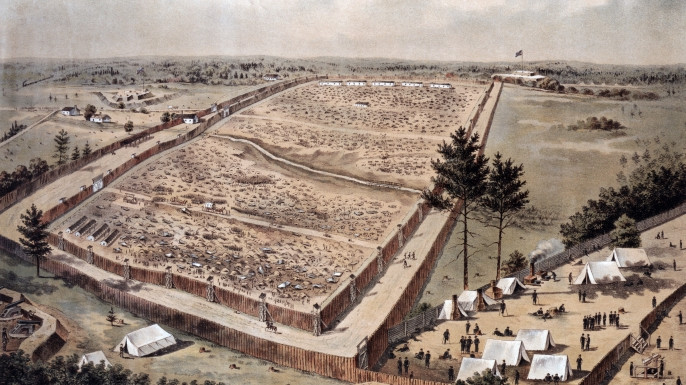Spectacular survival cases in the 19th century
These rare surviving stories show the resilience and hidden power of people in the face of adversity.
Sumter concentration camp, or Andersonville prison, is notoriously established by the Southern Federal government because of its brutality, crowded and dirty, according to the Out door revival.
Andersonville was the grave of 13,000 prisoners during the American Civil War (1861-1865). After the war ended, commanding the prison, Captain Henry Wirz was hanged for war crimes.
Among the survivors of Andersonville survived were Sergeant James Landon, Iowa State. After successfully escaping from prison, Landon was hit by his thigh and forced to use his own knife to slash his thighs with bullets. However, after 5 days of fleeing, Landon was arrested and forced to walk to prison by himself.
Serious wound in thigh plus bad conditions in Andersonville is considered a suspended death sentence for Landon. However, contrary to the prediction of the majority, Landon held out for six months before being transferred to another prison without medical assistance or treatment. The war ended, Landon returned to the North, where he received his first medical care after being injured. Landon lived well until he died at the age of 83.

Sumter concentration camp, Andersonville prison is the grave of thousands of prisoners during the American Civil War.(Photo: History).
Judah Paddock
Judah Paddock is the captain of Oswego, the ship crashed near the coast of Barbary, north Africa in 1800. Leaving the shipwreck, Paddock and his crew, including British and Americans, decided to go to Morocco, the kingdom of concern. intimate with the United Kingdom and the United States.
However, the crew was in danger of clashing with nomadic tribes in the Sahara desert, a group of people willing to detain and enslave anyone who violated their territory.
On the way to Morocco, Captain Paddock and his crew arose a contradiction and fierce controversy. Paddock was left with several close friends, then unfortunately fell into the hands of an aboriginal group and was sold into slavery.
Having been cruelly treated and working day and night to survive, Paddock had the intention to persuade the slave owner to take him to Morocco, where he assured a British official to pay his ransom. Accept the risk of being killed in the middle of the city if this doesn't happen, Paddock arrives in Morocco and is rescued by a British official by ransom. Paddock's other confidants are not as fortunate as the captain, they died in the time of slavery.
Robert Jaffrey
After being appointed to join the Royal Navy, British sailor Robert Jaffrey was not interested in the job and felt indignant when working under Captain Lake on the battleship Recruit. On one occasion when he was caught in a robbery, Captain Lake was angry, Jaffrey was left in an uninhabited island without food.
When the news reached the upper echelon, Lake was asked to return to the island and take the soldier home, however the captain could not find Jeffrey on the island. Lake was later accused of behaving inappropriately and being fired.
However, Jeffrey was fortunate to survive on the uninhabited island for nine days by eating limpet sea slugs and drinking rainwater in small niches on the rock before being passed by an American boat to rescue and take him to Massachusetts, USA He lived here for many years before returning to England.
Dr. William Brydon

After days of fleeing the pursuit of Ghilzai swordsmen, Dr. Brydon is one of the few who can preserve life.(Photo: Out door revival).
After capturing the Kabul capital in Afghanistan in 1839, British troops had to deal with rebellious tribes to keep the city. However, after only two years, the British army was forced to retreat when the situation worsened. A total of 4,500 soldiers and 12,000 civilians had to leave Kabul and begin their journey to India to flee.
On the way, they were massacred by the Ghilzai tribe and the army of Afghan warlord Muhammad Akbar, killing 12,000 people. British surgeon William Brydon is one of the few survivors. He decided to run to Jalalabad city with a few other people. After several days of fighting Ghilzai's swords on horseback, Dr. Brydon escapes the bloody pursuit when he is helped by soldiers of Jalalabad.
- The life of people in the bottom of society in London in the 19th century
- 19th century China through rare photos
- Objects similar to smartphones in the 19th century painting
- Rare photos of British colonial India in the 19th century
- Photos of life in China in the late 19th century
- What do you know about 19th-century television with
- Discovered two missing ships from the 19th century when searching for MH370
- Modern people are not as intelligent as people of the 19th century?
- Unexpectedly discovered the mysterious 19th century shipwreck in the Gulf of Mexico
- Excavating a grave in the 19th century
- Mummy woman froze 200 years
- X-rays - Great discovery of the 19th century
 'Fine laughs' - Scary and painful torture in ancient times
'Fine laughs' - Scary and painful torture in ancient times The sequence of numbers 142857 of the Egyptian pyramids is known as the strangest number in the world - Why?
The sequence of numbers 142857 of the Egyptian pyramids is known as the strangest number in the world - Why? History of the iron
History of the iron What is alum?
What is alum?